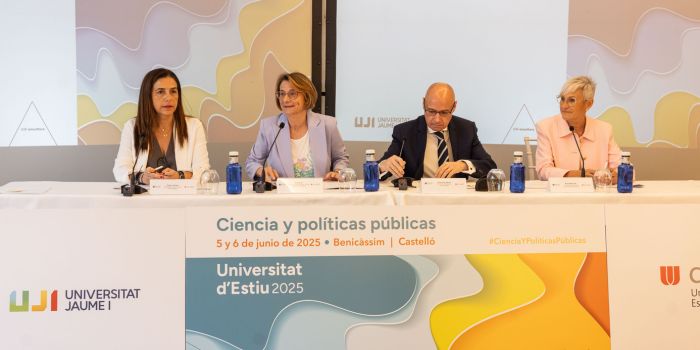Javier Oliver, Director of the Agència Valenciana d’Avaluació i Prospectiva (AVAP), was present at the summer course “Science and Public Policies”, held on June 5 and 6 in Benicàssim.
This event, organized by the Universitat Jaume I (UJI) and the Conference of Rectors of Spanish Universities (CRUE), brought together representatives from the academic, institutional, and scientific spheres to reflect on how to bring science closer to society and strengthen its role in shaping public policy.
A space for dialogue between science, universities, and politics
The course was inaugurated by Eva Alcón, President of CRUE and Rector of UJI; Francisco García Pascual, Secretary General of Universities; Esther Gómez, Regional Secretary for Universities; and Rosa María Gil, Deputy Mayor of Benicàssim. In their speeches, they emphasized the importance of promoting a decision-making system grounded in scientific evidence and the knowledge generated by universities.
Alcón highlighted that “universities not only generate knowledge, but we must also act as a vehicle for that knowledge to reach the productive, social, and political sectors.” She also underlined the urgent need to implement the “transfer of knowledge” assessment (sexenio de transferencia) and to build an ecosystem that helps retain research talent.
Scientific advice and citizen science
Throughout the event, various ways of connecting research and policymaking were discussed. In the opening keynote, Josep Lobera, Director of the National Office for Scientific Advice (ONAC), explained how this new body aims to facilitate access to scientific knowledge for government decision-making. “Trust is essential for advice to work,” he noted, stressing the need for a fluent dialogue between researchers and policymakers.
The day also featured several round tables with the participation of professors, rectors, and scientific advisors, who shared practical experiences on how to translate academic knowledge into legislative and governmental frameworks. A key topic was the importance of maintaining structures like ONAC in the future and consolidating the role of scientific advisors.
The first day concluded with a round table on citizen science, exploring new ways of involving the public in research and decision-making processes. Experts such as Francisco Sanz (Ibercivis Foundation), Josep Perelló (University of Barcelona), and Esteban Romero (University of Granada), among others, took part in the session.

The course concluded with a keynote address by Ximo Puig, Spain’s Ambassador to the OECD, entitled “Better policies (with science) for a better life,” offering an international perspective on the role of science in improving social and economic wellbeing.
AVAP’s presence at this forum reinforces the agency’s commitment to rigorous evaluation, university quality, and the promotion of public policies based on scientific knowledge. Events like this highlight the importance of institutional collaboration to successfully address challenges such as sustainability, public health, and digital transformation






